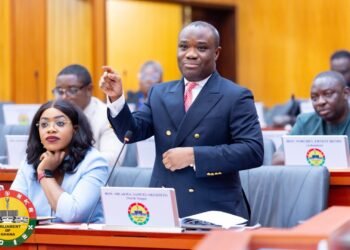In a democratic society, elections represent the cornerstone of the political process, allowing citizens to voice their preferences and elect representatives to govern. In the vibrant democracy of Ghana, the political landscape is a complex tapestry of parties, ideologies, and personal ambitions. One of the most intriguing aspects of this dynamic is the intense competition among party members for positions in government.
However, the pursuit of power within political parties before and after successful elections has often proven to be detrimental to the functioning of government. The infighting and power struggles that emerge within party ranks can hinder progress, undermine public trust, and ultimately impede the collective goals of serving the people.
“Because we’re convinced that we are there, a lot of people have begun taking positions and fighting over who will be what in the next government. Some people are not only fighting about the positions they will occupy. They are telling all others that they will be the kingmakers and they will be making appointments. It is unhealthy for some elements within the party to be fighting over positions in the next Mahama administration even though the party has not won the election yet.”
Johnson Asiedu Nketiah, Chairman of the National Democratic Congress (NDC)
The public places great importance on the integrity and unity of political parties. When party members fight over positions, it not only damages the party’s image but also erodes public trust in politicians and the political system as a whole.
Voters become disillusioned and feel alienated from the democratic process, believing that their elected representatives prioritize personal gain over the welfare of the nation. This erosion of public trust can have long-lasting consequences, leading to apathy, voter disengagement, and an overall decline in the quality of democracy.
At the official unveiling of Prof Jane Naana Opoku-Agyemang as the running mate of former President John Mahama in the upcoming December general elections, Mr Asiedu Nketia cautioned that such a premature scramble for places in a future NDC government could have dire consequences on the members’ morale.
Additionally, intra-party struggles often divert attention away from pressing issues that demand immediate attention. Resources that should be allocated to address societal problems, such as healthcare, education, or economic development, are instead expended on internal power struggles.
The time and energy wasted on personal disputes and maneuvering for positions leave little room for meaningful policy debates and constructive engagement on key matters. Consequently, the government’s ability to address pressing challenges and deliver positive change to society is compromised.
Fairness and Accountability are key
The views of ordinary citizens on the competition for government positions within political parties in Ghana are varied. Some citizens see it as a natural part of the democratic process, a way for party members to earn their keep and contribute to the party’s success. Others, however, view it as a sign of corruption and nepotism, where positions are awarded based on personal loyalty rather than merit.
“I believe that the competition for government positions within political parties is a reflection of the democratic process in action. It’s a way for party members to prove their loyalty and commitment to the party. However, it’s important that these positions are awarded based on merit and not just personal connections. If not, it can lead to a lack of accountability and corruption.”
Concerned Ghanaian Citizen
To overcome the detrimental effects of infighting, political parties and their members must prioritize unity, responsibility, and the collective interest over personal ambitions. This requires a commitment to a shared vision and a culture of collaboration, where party members work together to achieve common goals.
Party leaders should emphasize the importance of teamwork, encourage open dialogue, and ensure that internal conflicts are resolved through constructive means rather than power struggles.
Mr Nketia warned the party member, “I want to assure everybody that we’re not there yet… Don’t be fighting about positions, and don’t be talking about who will make appointments. Let’s all go for the hunting first and when we kill the game we can now argue about sharing of the meat.”
The competition for government positions within political parties in Ghana is a complex issue with far-reaching implications. While it is a natural part of the democratic process, it is crucial that these positions are awarded based on merit and not just personal connections.
The views of ordinary citizens on this matter are varied, but there is a general consensus that fairness and accountability are key. As Ghana continues to evolve, the political parties must address these issues to ensure that the competition for government positions serves the interests of the electorate and the nation as a whole.























